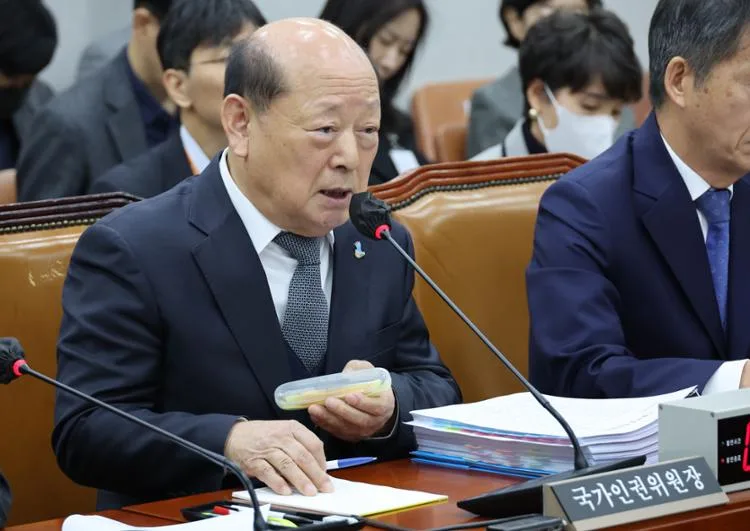
Song Doo-hwan, the chairperson of the National Human Rights Commission of Korea (NHRCK), answers questions during a parliamentary audit at the National Assembly in Seoul, Nov. 8. Yonhap
The United Nations Committee on the Elimination of All Forms of Discrimination Against Women (CEDAW) has urged the Korean government to provide full reparations to three Filipinas who were forced into prostitution.
Song Doo-hwan, the chairperson of the National Human Rights Commission of Korea (NHRCK), announced via a statement, Monday, that the government must adhere to CEDAW’s decision, acknowledging its failure to identify and protect the three women as trafficking victims. He also emphasized that CEDAW criticized the government for not ensuring access to justice and adequate remedies.
The committee released its decision on Nov. 24 after reviewing a complaint filed by the three Filipinas as well as the Korean government’s official response to the issue.
The three victims initially entered Korea on special E-6-2 visas designated for the entertainment industry, all having been hired as singers in the summer of 2014. However, they were ultimately forced to work as waitresses at the Golden Gate Club in Seoul.
According to the committee’s report, the victims were confined and compelled to perform sexual services with customers, while working as waitresses. The club owner confiscated their passports and subjected them to both psychological and physical violence.
Even though the three were reported as being victims of trafficking to the police, they were only questioned on matters relating to prostitution. Indeed, they were detained for 40 days, and neither immigration nor police officers inquired about them being potential victims of sex trafficking or other infringements of their rights. Their deportation orders were also given to them in April 2015.
The committee observed discrimination throughout the investigation and judicial process, highlighting the failure of the Korean government to ensure the victims’ access to justice and adequate remedies, thereby violating their rights under CEDAW.
“In this case, we observed stereotypical views from the police and courts, which hampered their identification of trafficking victims. Victims are secondarily victimized by the criminal justice system as they were denied access to justice,” said a committee member.
The committee issued recommendations to the Korean government, including the provision of full reparations, revisions to the current E-6-2 visa regime, enhanced monitoring of entertainment companies recruiting foreign women, and the enactment of a comprehensive law on trafficking.
This case marks the first instance that CEDAW personally petitioned against Korea, drawing an unusual amount of attention as the U.N. features a Korean language version on its official website, according to the NHRCK.
Implementation of the recommendations is anticipated to involve key government departments such as the Ministry of Justice and the Ministry of Gender Equality and Family. Both ministries have yet to provide an official response, stating that specific implementation plans are still being discussed.
Meanwhile, CEDAW has requested the Korean government to submit in writing its measures to implement the recommendations within six months.

